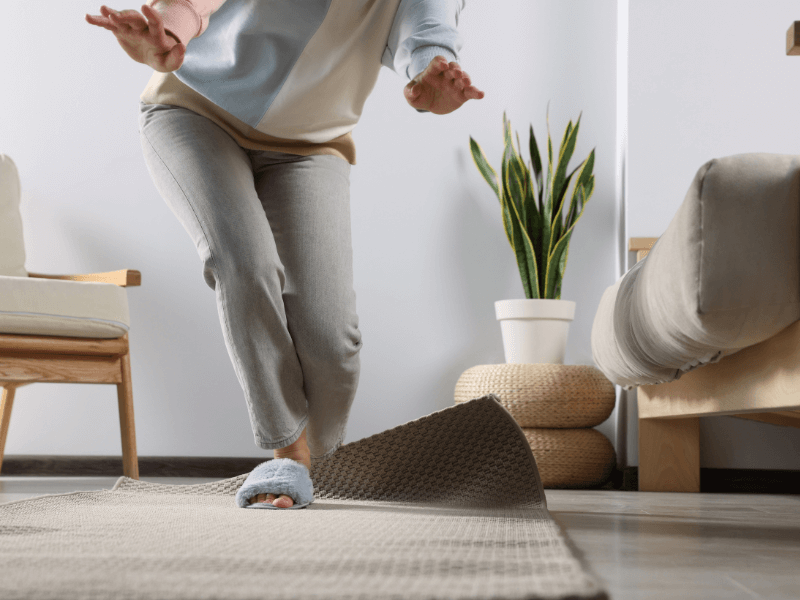If you fall over, stay calm, lie still, and check for injuries. If you’re hurt or feel weak, call for help. If uninjured, roll onto your side, get onto your hands and knees, and then slowly stand using a stable object for support. Sit and rest before deciding whether you need medical attention.
Everyone stumbles, trips or slips occasionally, so it can be incredibly helpful to know what to do in the crucial moments immediately after a fall. That’s why we’ve put together this guide on how to cope with falls.
You fall over when you lose – and are unable to regain – your balance. Adrenaline rushes around your body, and your muscles go rigid. Instinctively, you stretch out your arms so they absorb most of the impact rather than more fragile areas. However, the fall still sends shockwaves through your body.
You’re likely to feel shaken after falling over. However, most falls are minor, about 20% result in serious injuries including fractured bones and dislocated joints. Falling over might point to a health condition such as low blood pressure, especially if it’s happening a lot. So if you’ve had a bad fall or are falling frequently, seek medical assistance.
Read on to familiarise yourself with why falls happen, how best to react to falling over, and how our experienced London podiatry team can help you to get back on your feet.
Why People Fall Over
‘Falls are usually caused by an interaction of a number of risk factors,’ explains the NHS. The main ones can be divided into three categories:
Physical Risk Factors
- Weak muscles – due to health conditions such as muscular dystrophy or sedentary lifestyles
- Poor balance – often caused by inner ear infections
- Unsteady gait – loose/high-heeled shoes and painful foot problems (corns, bunions, ingrown toenails, etc.) are common culprits
- Impaired vision – makes it harder to spot obstacles and judge distances
- Diabetic neuropathy – loss of feeling in the feet impairs coordination
Mental Risk Factors
- Feeling lightheaded/dizzy – often due to dehydration or medication side effects
- Confusion and slow reactions – associated with alcohol consumption, for instance
Environmental Risk Factors
- Uneven/wet surfaces – including poorly maintained floors/pavements
- Obstacles – clutter, tools, etc.
- Poorly lit areas – particularly problematic for visually impaired individuals
Older People Often Develop a Fear of Falls
Sadly, a third of people over 65 fall badly annually. People are more likely to fall over and be seriously injured as they get older because the ageing process impairs strength, balance, eyesight and cognitive function.
Several health conditions primarily affecting the elderly also increase the risk of falls:
- Arthritis – joint inflammation reduces mobility
- Dementia – compromises the brain’s ability to control movement and detect hazards
- Osteoporosis – reduced bone density creates postural/mobility issues
- Parkinson’s disease – loss of nerve cells leads to unstable movement and difficulty turning around
- Stroke – impairs coordination and may weaken or paralyse one foot/leg
According to Age UK, 36% of older adults say falls are their main worry. In later life, it’s common to develop a fear of falling over and therefore reduce activity levels. However, this actually increases the risk of falls, as lack of exercise weakens the body.
What to Do Immediately After Falling Over
Knowing what to do in response to a fall makes this challenging situation easier:
- Try to stay calm and focused – panicking only disrupts your thought processes.
- Lie still and assess how you feel. Are you injured?
- If you’re badly hurt or distressed, don’t try to stand up. Request medical help using your phone (crawl to it if necessary) or by calling out. If there’s a coat/blanket within reach, cover yourself while you wait.
If you feel strong enough to stand up, roll onto your side then get onto your hands and knees. Grip a stable object, place one foot firmly on the floor and slowly lift yourself up. Sit and rest while deciding if you need medical assistance. At the very least, contact a loved one about your fall.
Fall Prevention Tips
There are practical steps you can take to help prevent falls:
- Stay active to keep muscles/joints strong and flexible.
- Wear securely fastened, comfortable footwear from shoe shops offering foot measuring services.
- Avoid walking over hard floors in socks/tights.
- Stay well hydrated.
- Eliminate trip hazards at home (secure loose rugs with rug tape, mop up spillages, use cable ties to keep cables neat, etc.).
Our London Podiatrists Can Help You
If you’ve had a fall or are worried about falling over, you can benefit hugely from visiting our London podiatry team.
We conduct thorough biomechanical assessments, including gait analysis, to identify issues and then correct them (with orthotics, for example), thereby improving foot/ankle function. We treat painful foot problems such as ingrown toenails too. Diabetic foot assessments, which guard against nerve damage, are also available.
Plus, our Foot Mobilisation Therapy and foot exercises can make your lower limbs feel stronger, suppler and steadier.
Overcome and avoid falls with Feet By Pody – book an appointment today.

